Mathematics KS1
Mathematics Curriculum
Intent
Most of our children at Boldmere enter our school with a reasonable grasp of number and maths concepts (e.g. the ability to count), although in many cases, this is a shallow depth of knowledge. Our aim is to ensure a full grasp of early maths concepts and deepen understanding.
We believe that every child can thrive in mathematics and provide opportunities for children of all ability levels. We want our children to embed our core value of resilience and become enthusiastic learners who embrace challenge and most importantly enjoy learning. We provide the foundations for our children to develop a positive-mindset and fulfil their curiosity through enjoyment and exploration – a key principle of early years education. We aim to inspire our children and encourage them to become confident and fluent learners who recognise the value and importance of mathematics in the world around us.
Our mathematics curriculum embeds core knowledge and skills in the EYFS, which enables children to progress when moving into KS1. Our curriculum aims to instil a love of maths and provide our children with a solid foundation as they move into KS2 and life-long knowledge and skills they can apply into all areas of life.
Implementation
We have made the decision as a school to write separate implementation statements for Early Years and KS1, because this reflects the different contexts of the EYFS and KS1 and meets the needs of our children.
Our Mathematics curriculum has been designed to enable our children to become confident mathematicians and independent and curious learners. Our school uses the National Curriculum as the core of our Mathematics curriculum. In addition to this, we use aspects of the White Rose scheme of learning and the NCETM guidance, alongside ‘Maths – No Problem!’ and ‘Power Maths’, both of which are recommended by the DfE to support with the teaching of mastery, where children acquire a deep and secure understanding of the mathematical concepts taught at each stage of their learning. The White Rose small steps guidance provides us with a scaffold for progression within areas of mathematics and a structure and sequencing of themes and concepts. Our curriculum design enables our children to develop and build on their initial knowledge and understanding.
Our Mathematics curriculum design gives our children opportunities to demonstrate mastery through a focus on reasoning, problem solving and varied fluency. Problem solving gives our children an engaging, real-life context for mathematical concepts and enables them to demonstrate a solid understanding. A focus on reasoning enables our children to demonstrate a secure understanding of mathematical concepts by talking through, justifying and explaining their thinking either verbally or by writing it down. We give our children opportunities to develop their fluency and the ability to apply the same skill to multiple contexts. By becoming fluent mathematicians, our children develop the ability to choose the most appropriate method for solving a problem in addition to being able to recall key mathematical facts rapidly and accurately.
We explicitly teach a defined mathematical vocabulary set across EYFS and KS1 which enables all children to share an understanding of the key vocabulary within mathematics. Our curriculum allows our children to apply their skills to all areas of learning, e.g. applying mathematical skills when handling data in Science, in order to embed, make links and enrich learning. We recognise the importance of enjoyment in our curriculum, and encourage children to embrace Mathematics outside of the classroom, through hands-on Maths Workshops and the opportunity to enjoy a range of maths games.
We recognise the importance of children developing their mathematical curiosity and value a hands-on and practical approach in mathematics. Therefore, we incorporate concrete (using practical resources such as tens and ones or Numicon), pictorial (using or drawing own pictures) and abstract (e.g. writing a number sentence) aspects in to our lessons, which is particularly important for our infant children. We split our daily maths lessons in to a guided and independent session. Both sessions include an element of problem-solving and giving the children an ‘anchor task’ from which the focus maths concepts can be taught and explored. In our daily practice, we adapt our teaching to suit the needs of our children by providing scaffolded support, interventions and opportunities to deepen learning and understanding where needed, in order to ensure all children make good progress and achieve their best.
What does Maths in KS1 look like at Boldmere Infant and Nursery School?
Our main principles of teaching maths in KS1 are:
- Developing children’s understanding of number -
- Through a variety of practical activities.
- Through making links between activities.
- Through applying Maths in different contexts.
- Teaching children to understand concepts and methods – not simply the ‘tricks’ to get the right answer.
- Securing basic number facts and mental calculations.
At Boldmere Infant and Nursery School, all children are given the chance to achieve ‘expected standard’ by the end of KS1. For this reason, children are not ability grouped, as we believe this could lead to the achievement of some children being capped. Therefore, all children have access to the same challenges/activities which they work through independently or with support throughout lessons. Children are given additional support and 'greater depth' challenges as and when to suit their needs.
We recognise the importance of a hands-on, practical approach in order to best support children's learning and understanding. Maths is taught through the use of a wide range of practical resources such as double-sided counters, numicon, tens and ones, tens frames and bead strings. This enables lessons and concepts to be visually stimulating, tactile and interactive in order to help children visualise and have a deeper understanding of numbers rather than see them as an abstract concept. Here are some of the practical resources our children have access to during Maths lessons.

The CPA Approach
During lessons, children should demonstrate the skill being taught in 3 different ways and should be confident moving between them. This is known as the Concrete, Pictorial, Abstract approach. The Concrete-Pictorial-Abstract approach uses physical and visual aids to build a child’s understanding of abstract topics.
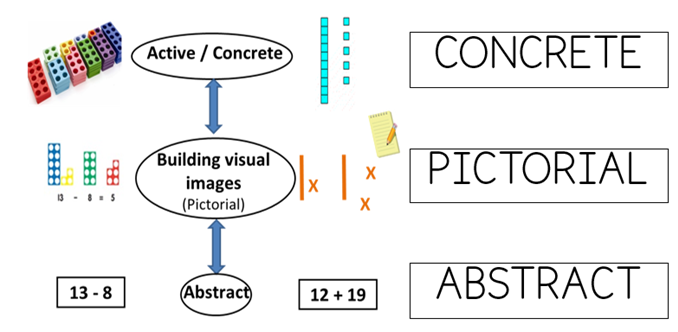 CONCRETE – Using physical objects to represent and solve problems such as tens and ones, counters, numicon. This brings concepts to life by allowing children to visualise and handle problems practically.
CONCRETE – Using physical objects to represent and solve problems such as tens and ones, counters, numicon. This brings concepts to life by allowing children to visualise and handle problems practically.
PICTORIAL – Using drawings and pictures to solve problems e.g. drawing tens sticks and ones cubes. This encourages children to make connections between the concrete objects and the abstract picture/diagram that represents the objects from the problem.
ABSTRACT – Solving maths problems using numbers – e.g. writing the number sentence once children have demonstrated a solid understanding of the concrete and pictorial stages of the problem.
.
KS1 Maths lessons
In KS1, children have split Maths lessons. Lessons consist of two parts -
- Guided maths
- Independent maths
Guided Maths
During the guided session, children are taught as a whole class a ‘small step’ or skill. With support, children are guided through this skill so that they become confident and secure through a variety of activities containing all 3 elements – concrete, pictorial, abstract. These sessions are often very practical and heavily discussion based to draw out the reasoning and vocabulary and demonstrate a secure understanding. In all lessons there are opportunities for children to talk to their partners/work in groups and explain/clarify their thinking.
Take a look at some of our guided maths sessions in action!

.jpg)
.jpg)

Independent Maths
After the guided session, children have the opportunity to practise the small step independently by working through challenges at their own pace. Support is provided to those children who may need additional practise, and children who are demonstrating the ‘expected standard’ are be challenged with 'greater depth' activities.
Enrichment opportunities:
Maths Workshops
Throughout the year, we hold ‘Maths Workshop’ days, where parents and carers have the opportunity to attend a teacher-led workshop. This is an opportunity for parents to gain a greater understanding and for us to demonstrate how maths is taught in school and share methods, concepts and resources that are used within school to support children’s learning.
The workshops also involve a ‘hands-on’ session where parents have the opportunity to work with their child, completing lots of fun maths activities and games together.
Take a look at some photographs of our most recent Maths Workshops in Year 1 and Year 2!
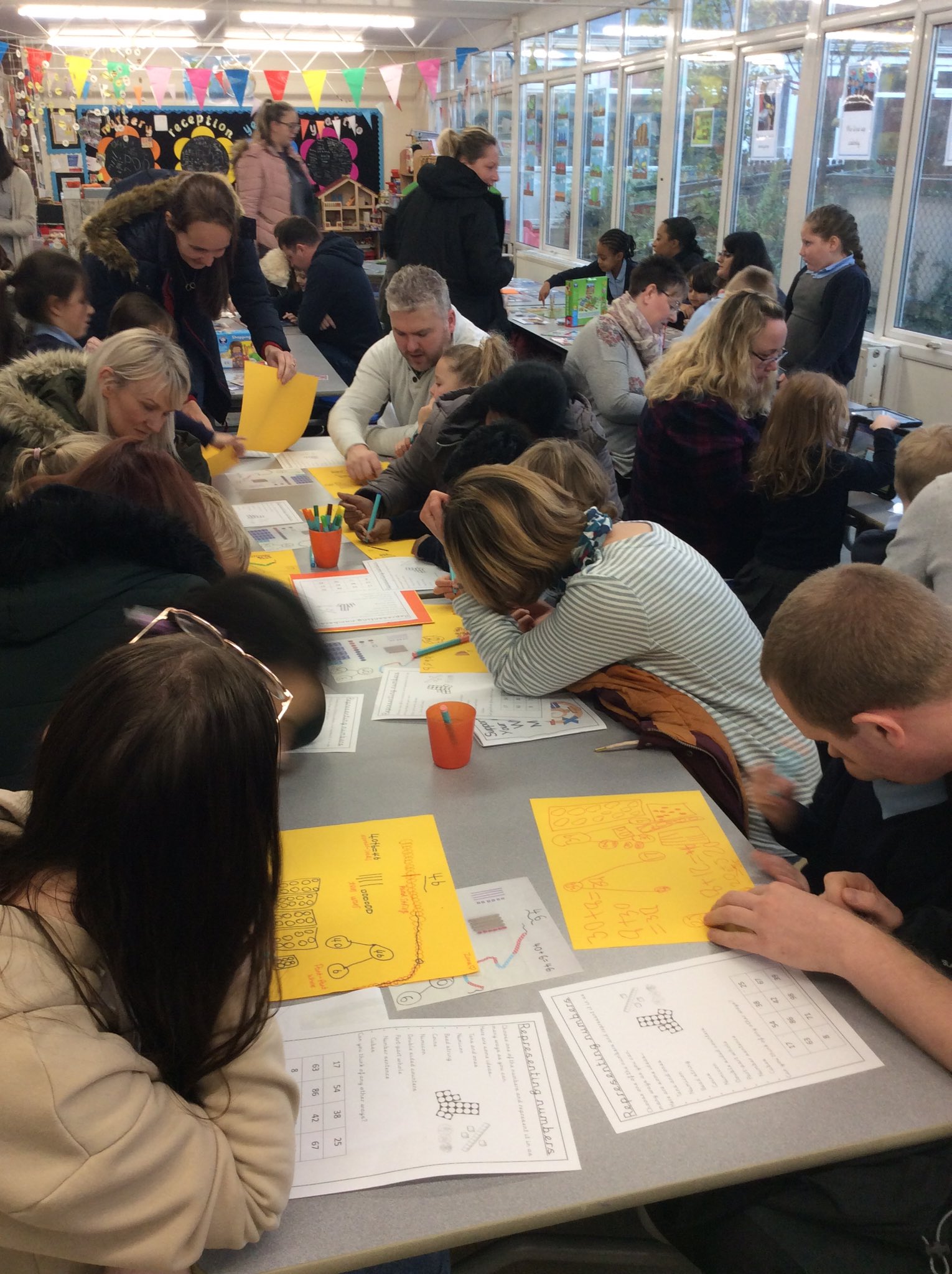
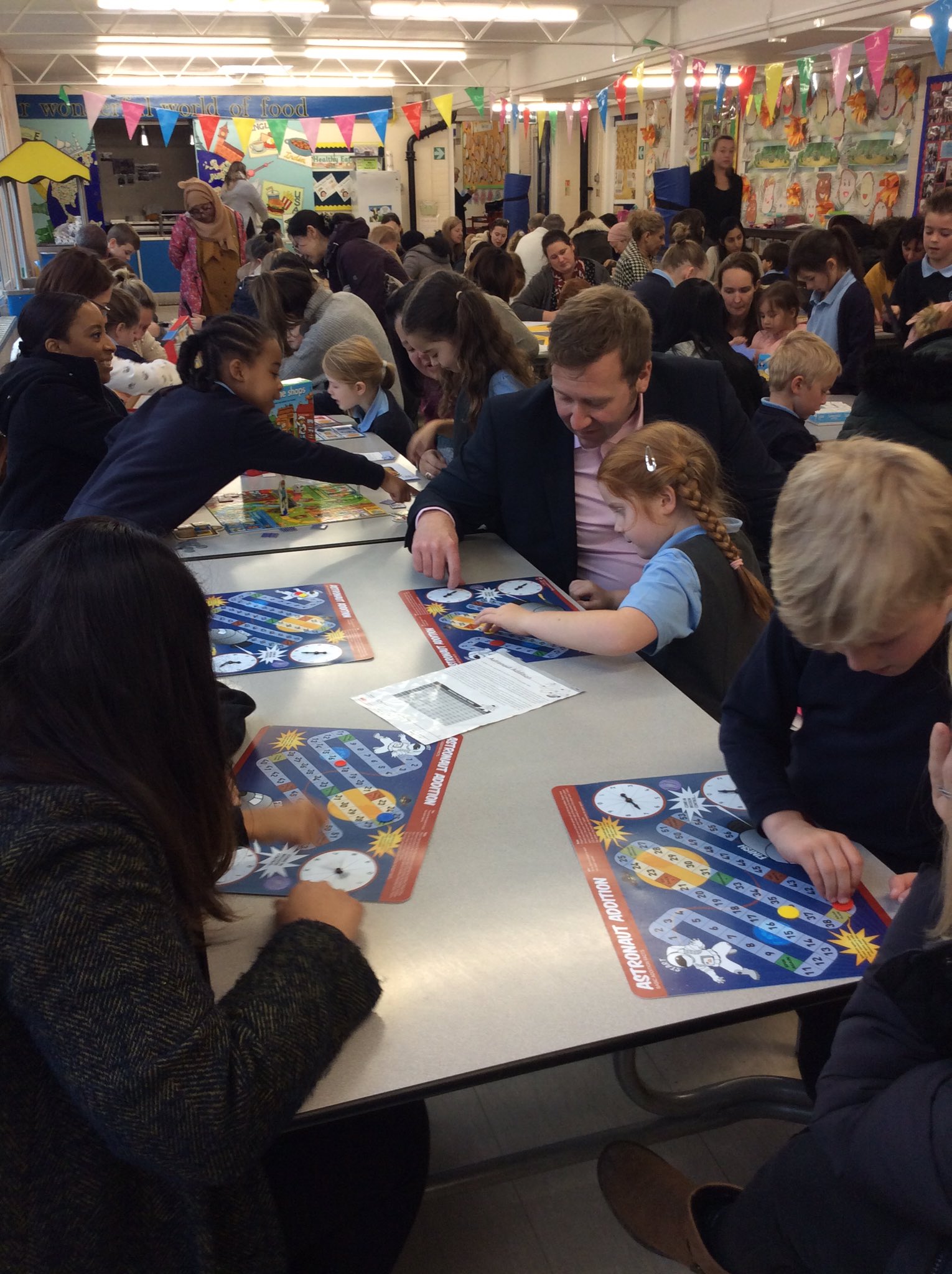
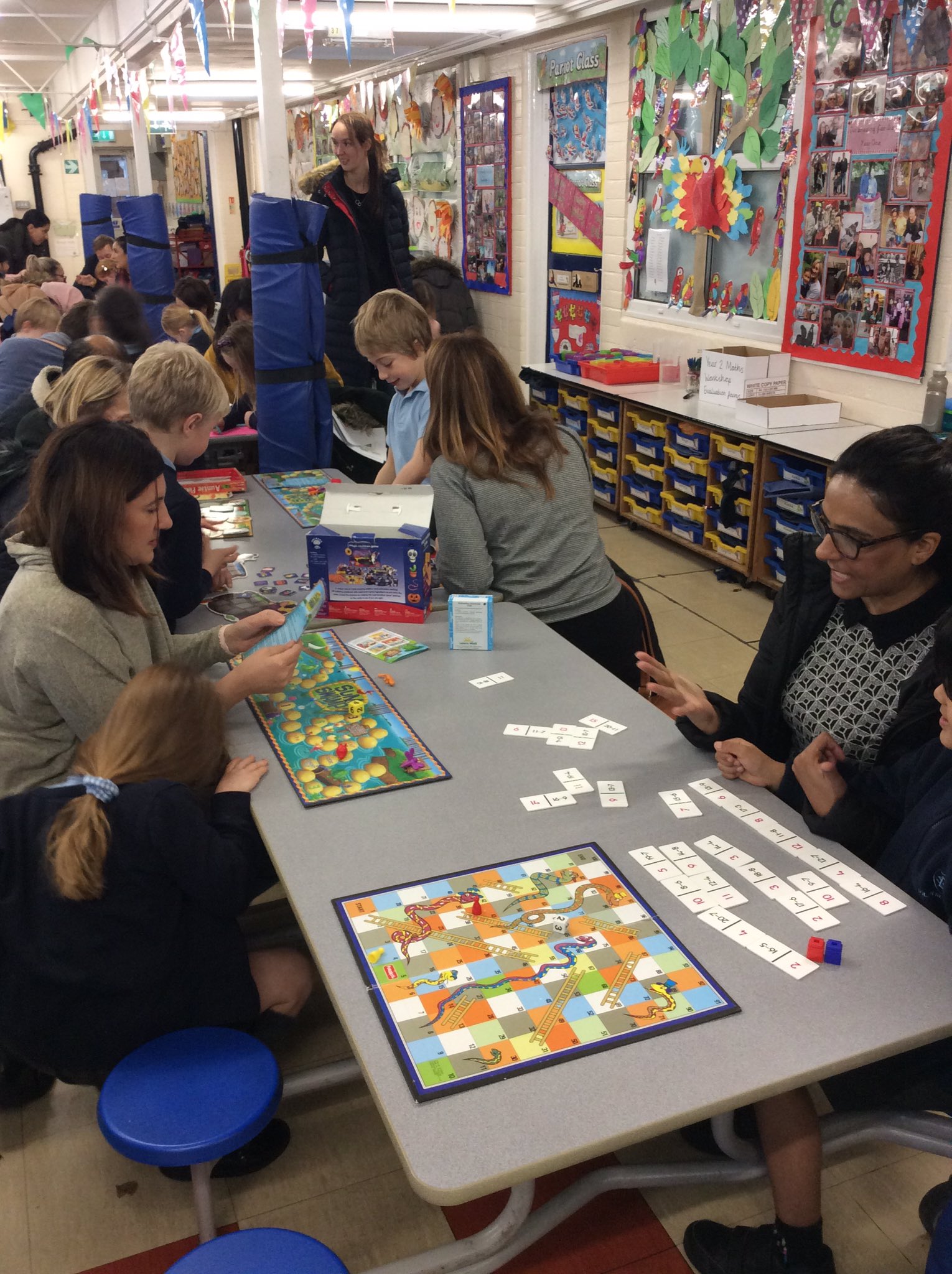
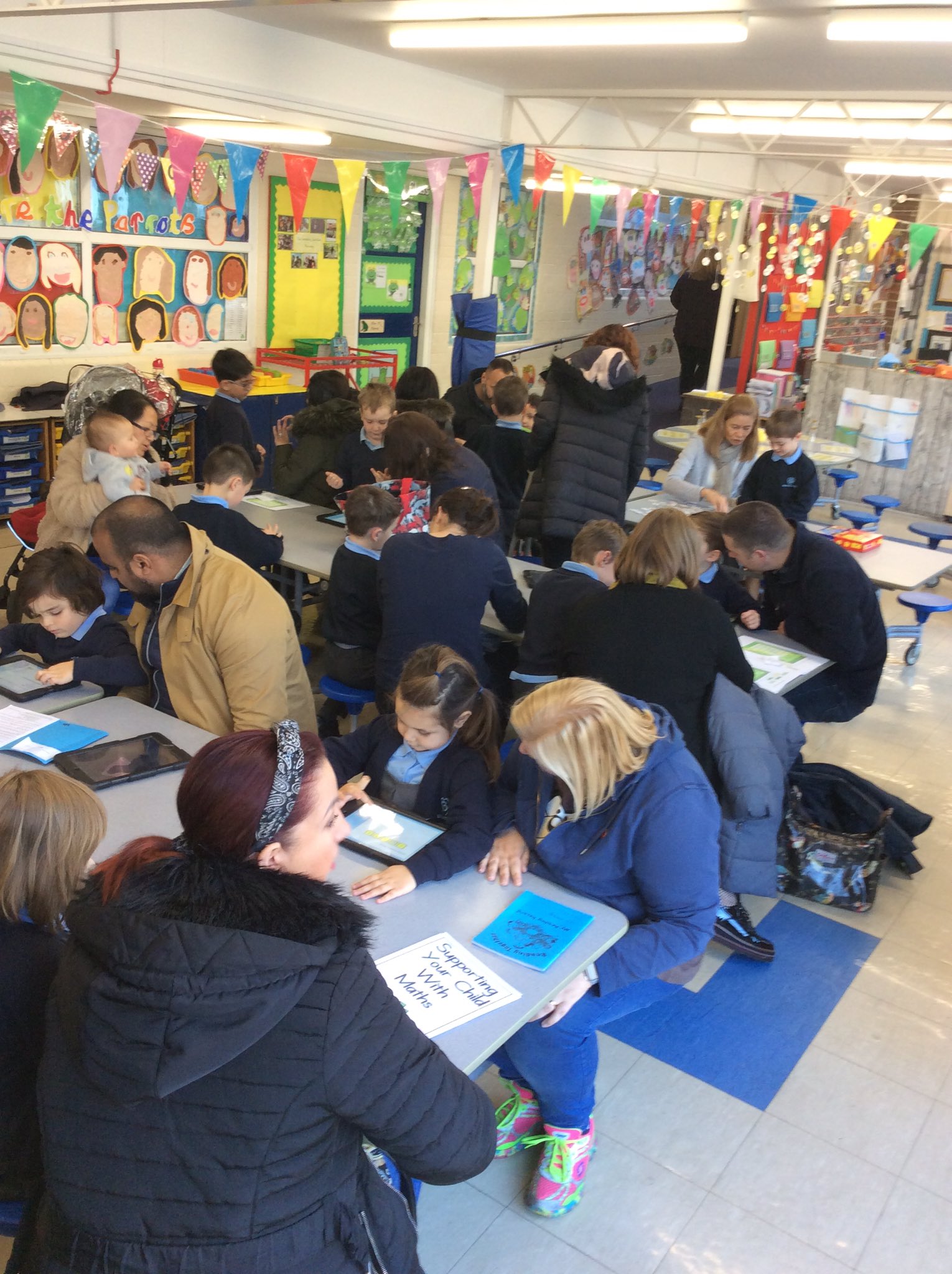
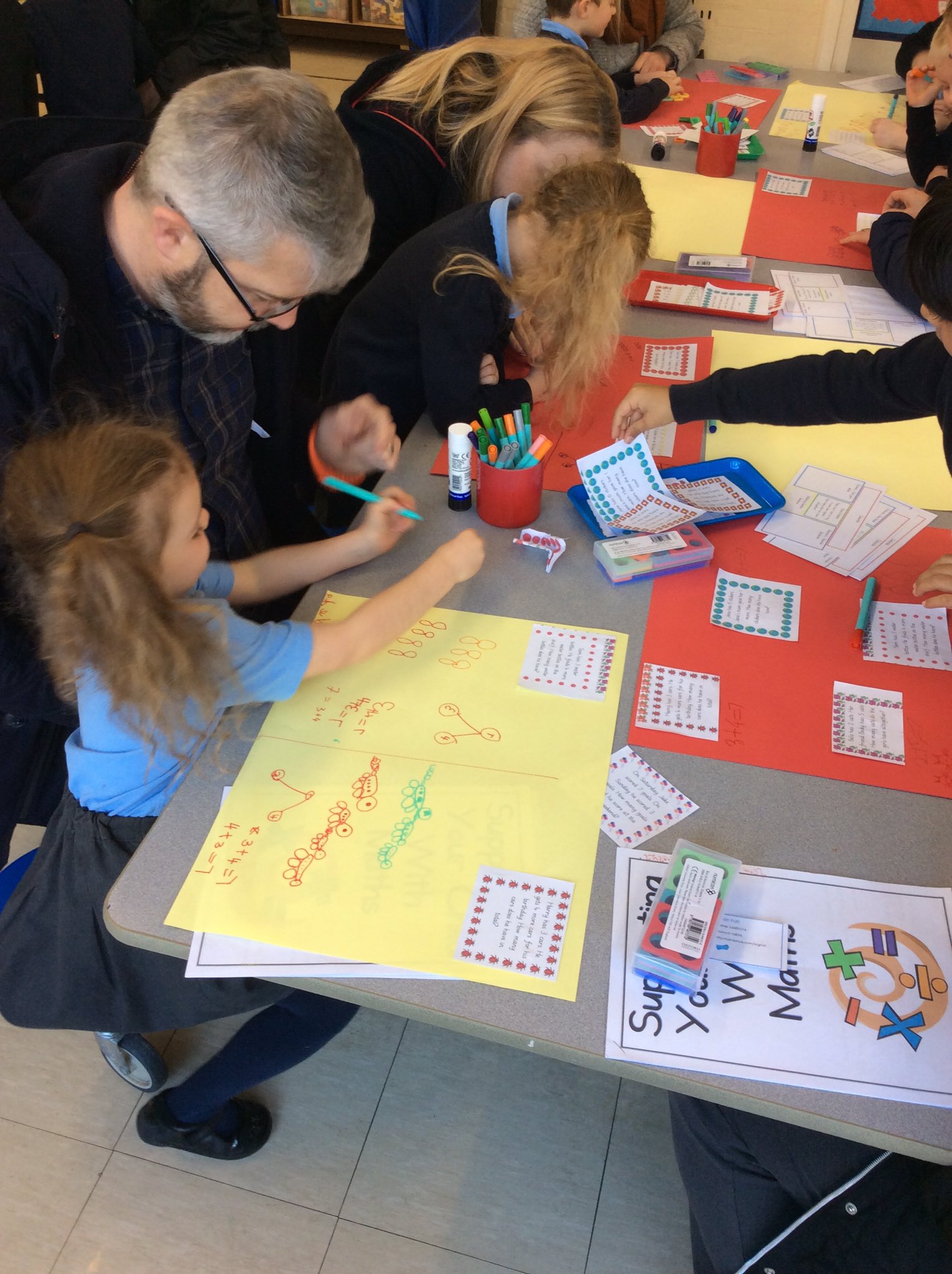
Useful resources
We suggest the following websites to best support your child at home:
BBC Bitesize KS1 Maths - learning resources, videos and games/activities for all concepts/themes.
Top Marks - fun maths games covering all concepts/themes.
Snappy Maths - a range of printable worksheets to support developing fluency and rapid recall facts e.g. number bonds, addition and subtraction. A wide range of interactive games for both tablet/ PC.
Primary Games Arena - fun maths games.
White Rose Maths - Schemes of Learning - for further ideas for questioning, reasoning and problem solving. It also gives you lots of great key mathematical vocabulary for each unit.
.png)
